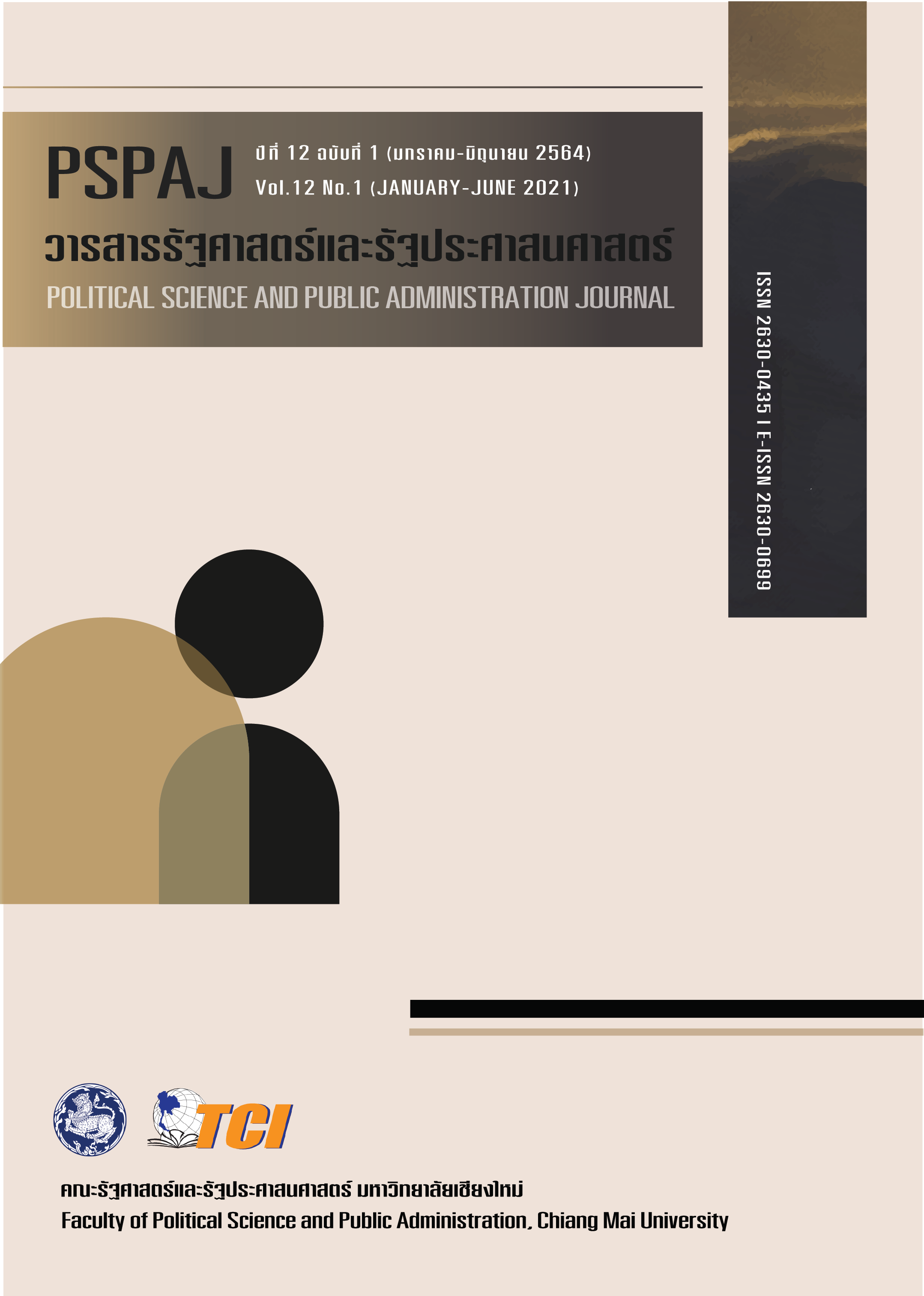“This Constitution was Designed for Us”: The Impacts on the Laws for “Political Party Reform”
Main Article Content
Abstract
The three objectives of this research article are to analyze the legal frameworks related to political party reform that occurred in 2017, study whether these legal frameworks could reform Thai political parties, and present guidelines for the amendment of the Thai Constitution. This article is an extension of research on “Reforming Political Parties,” which was conducted before the general election in Thailand in 2019. Legal frameworks were used to analyze the results of the actual political outcome one year after the election. The research findings are as follows: First, the people responsible for drafting the Constitution desired political parties to be political institutions that are deeply rooted in Thai society. However, the stakeholders reflected that this was impossible because current laws do not correspond to reality. Furthermore, when these laws were enforced, problems arose in many areas especially in the Mixed Member apportionment system (MMA). The requirement of political party members, resulting in fragmentation of both opposition and government political parties. Last, to reform political parties, the Constitution must be amended concerning facets of the above issues with the full participation of stakeholders and Thai citizens.
Downloads
Article Details

This work is licensed under a Creative Commons Attribution-NonCommercial-NoDerivatives 4.0 International License.
- เนื้อหาและข้อมูลที่ลงตีพิมพ์ในวารสารรัฐศาสตร์และรัฐประศาสนศาสตร์ถือเป็นข้อคิดเห็นและความรับผิดชอบของผู้เขียนบทความโดยตรง ซึ่งกองบรรณาธิการวารสารรัฐศาสตร์และรัฐประศาสนศาสตร์ ไม่จำเป็นต้องเห็นด้วย หรือร่วมรับผิดชอบใดๆ
- บทความและข้อมูล ที่ได้รับการตีพิมพ์ในวารสารรัฐศาสตร์และรัฐประศาสนศาสตร์ ถือเป็นลิขสิทธิ์ของวารสาร หากบุคคลหรือหน่วยงานใดต้องการนำข้อมูลไปใช้ประโยชน์ในทางวิชาการ ขอให้อ้างอิงแหล่งที่มาด้วย
References
โกสินทร์ วงศ์สุรวัฒน์, และนรนิติ เศรษฐบุตร. (2521). พรรคการเมือง. กรุงเทพ: มหาวิทยาลัยธรรมศาสตร์.
คณะกรรมการการเลือกตั้ง. (2562). หลักเกณฑ์และวิธีการคำนวณ ส.ส. แบบบัญชีรายชื่อ. สืบค้นเมื่อ 15 มิถุนายน 2562, จาก https://www.ect.go.th/ect_th/download/article/article_20190528140635.pdf
ณัชชาภัทร อมรกุล, และอรรถสิทธิ์ พานแก้ว. (2562). ความหวังและความน่าจะเป็น: ฉากทัศน์พรรคการเมืองไทย ภายใต้รัฐธรรมนูญ พ.ศ. 2560. สืบค้นเมื่อ 15 มิถุนายน 2562, จาก http://www.kpi.ac.th/knowledge/book/data/926
พระราชบัญญัติประกอบรัฐธรรมนูญว่าด้วยการเลือกตั้ง พุทธศักราช 2561. (2561, 12 กันยายน). ราชกิจจานุเบกษา. เล่ม 135 ตอนที่ 68 ก. หน้า 40-97
พระราชบัญญัติประกอบรัฐธรรมนูญว่าด้วยพรรคการเมือง พุทธศักราช 2560. (2560, 7 ตุลาคม). ราชกิจจานุเบกษา. เล่ม 134 ตอนที่ 105. หน้า 1-41
รัฐธรรมนูญแห่งราชอาณาจักรไทย พุทธศักราช 2560. (2560, 6 เมษายน). ราชกิจจานุเบกษา. เล่ม 134 ตอนที่ 40. หน้า 1-90
สมยศ เชื้อไทย. (2547). คำอธิบายวิชากฎหมายรัฐธรรมนูญ. กรุงเทพ: คณะนิติศาสตร์ มหาวิทยาลัยธรรมศาสตร์.
Duverger, M. (1972). Party Politics and Pressure Group. New York: Thomas Y. Crowell Company.
Goodman, W. (1956). The Two-Party System in the United States. Princeton: D. Van. Nostrand Company, Inc.
Mainwaring, S. (1998). Party Systems in the Third Wave. Journal of Democracy, 9(3), 67-81
Neumann, S. (1956). Modern Political Party. Chicago: University of Chicago Press.
Ranney, A., & Kendall, W. (1956). Democracy and the American Party System. New York: Harcourt, Dorace and Company.
V.O. Key., Jr. (1964). Politics, Parties, and Pressure Groups. New York: Thomas Y. Crowell Company.


